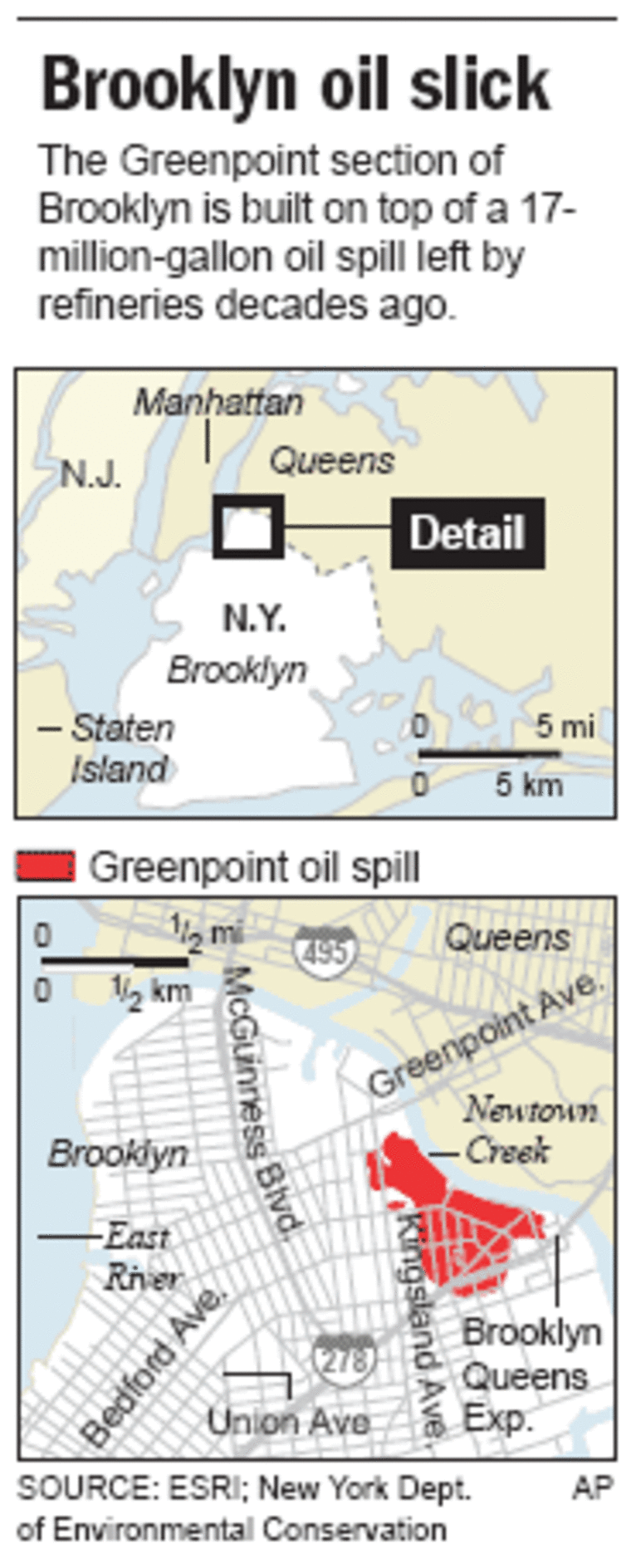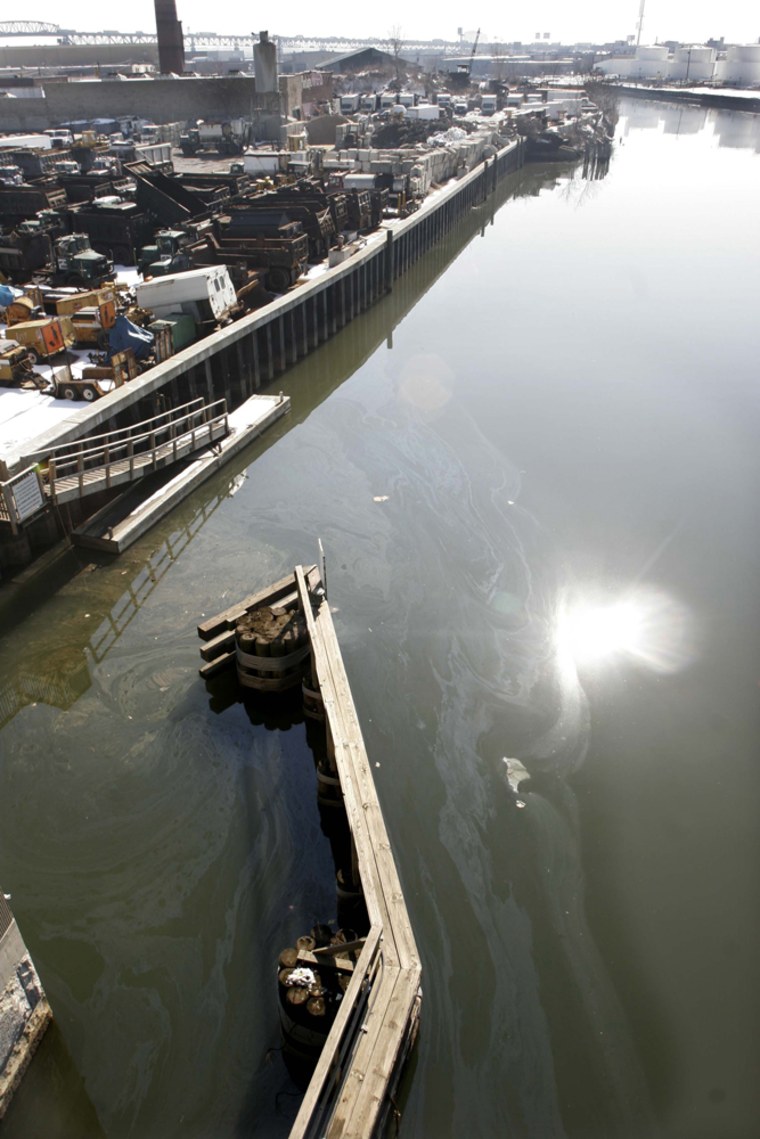Big Oil left most of the Brooklyn waterfront decades ago, but the industry's legacy still bubbles to the surface on Newtown Creek.
A thick black smear as tall as a man marks the spot where petroleum seeps from one of the bulkheads lining the canal, which runs past a demolition yard and sewage treatment plant on its way to the East River.
Much of the ooze collects behind a floating boom, but goblets still escape in the current and leave an oily sheen floating on the surface.
The slow leak is just a hint of what refineries left behind during more than a century on the creek's banks.
More than Exxon Valdez
Beneath the industrial yards and townhouses of Brooklyn's Greenpoint section lies an underground oil slick, spread out over an area as big as 41 football fields, containing more petroleum than the Exxon Valdez dumped off the Alaskan coast.
The details of how so much oil got in the ground are still something of a mystery, but Exxon Mobil accepted responsibility for much of the damage in 1990 and has been pumping oil from the neighborhood's water table ever since.
The cleanup, though, has been painfully slow. More than half of the 17 million gallon spill is still thought to be in the ground. A number of Greenpoint families say their patience has finally run out.
More than 20 people who live above the oil filed a lawsuit in December, claiming the underground plume is releasing foul-smelling fumes that could be toxic or flammable.
Soil tests conducted this summer by the environmental group Riverkeeper suggested the spill might be emitting benzene gas, which can cause leukemia, and methane, which can explode in a confined space.
20-year project?
The tests were scientifically inconclusive, but the results still struck fear among residents. They were further incensed by a Department of Environmental Conservation estimate that the mop-up would take another 20 years.
"Twenty years! Are they kidding?" said one plaintiff, Robert McErlean, 58. "If they wanted to come in and drill for oil for profit, you know they'd have that oil out in 20 days!"
In the meantime, McErlean said, residents in scores of townhouses standing above the spill have to deal with the scent of petroleum in their basements after periods of heavy rain, and worries about the safety of their backyard gardens.
State health officials downplayed the results of Riverkeeper's tests, saying other samples had found no hazard.
"All preliminary data and test samples collected near the spill site indicated that there was no immediate public health concern," said Department of Health spokesman Jeffrey Hammond.
Most of the oil is dozens of feet underground. Brooklyn doesn't use wells for drinking water. Cancer rates in Greenpoint are also lower than elsewhere in the city, according to state data, and Exxon Mobil spokesman Brian Dunphy said vapor studies have indicated that no vapors are getting into homes.
Erin Brockovich drafted
Their assurances aren't likely to end the legal battle.
The families are represented by the California law firm Girardi & Keese, which brought in celebrity anti-pollution crusader Erin Brockovich to recruit more plaintiffs. They are seeking unspecified damages against Exxon and two other oil giants, Chevron and BP.
In a second lawsuit, Riverkeeper is seeking fines of $32,500 per day from Exxon Mobil for every new oil discharge into the canal, plus back fines of $27,500 for discharges before 2004.
That suit, joined this winter by city council members Eric Gioia and David Yassky and Brooklyn's Borough President Marty Markowitz, seeks to pressure the company into implementing a better system for extracting the oil.
"We know there are technologies out there that are a hell of a lot more aggressive," said Riverkeeper investigator Basil Seggos. Some improvements, he said, might include installing wells that treat more groundwater and ventilation systems that draw away bad gases.
"The company has chosen this basic technology. It is inefficient and it does nothing to prevent the vapors from escaping into the community," Seggos said.
The oil companies note that the cleanup has accelerated in the past few years, in part because BP doubled the number of recovery wells on contaminated land it bought from Mobil in the 1960s.
An overhaul of the Newtown Creek containment system has also led to significantly fewer gallons of oil reaching the water, according to a Chevron spokesman.
Long trail of responsibility
The companies disagree about who is responsible for various parts of the spill.

The first of Greenpoint's refineries opened in 1867, just eight years after Edwin Drake struck oil in northwest Pennsylvania.
Much of the oil likely leaked over many decades, Dunphy said, at a time when industry was held to "different environmental and operating standards."
Some have blamed much of the leakage on a 1950 explosion caused by fuel seeping into Greenpoint's sewer system. The scope of the plume wasn't discovered until 1978, when the U.S. Coast Guard noticed oil flowing from the creek shoreline.
By then, most petroleum company operations in the neighborhood had closed, leaving behind industrial blight and hundreds of families worried about their health.
McErlean, whose grandfather was a refinery worker, said he believed only public pressure would keep the companies from walking away entirely.
"The more squeaks in the wheel, the more it is going to get oiled," he said.
"Not that we want any more oil down here."
